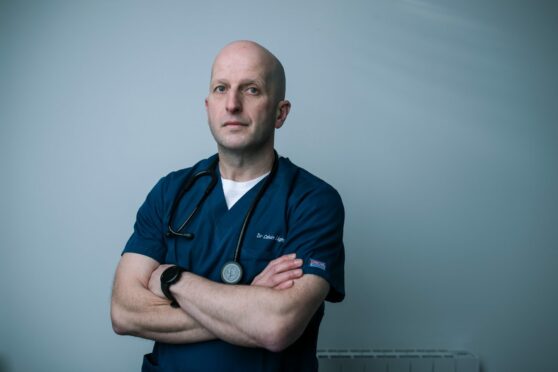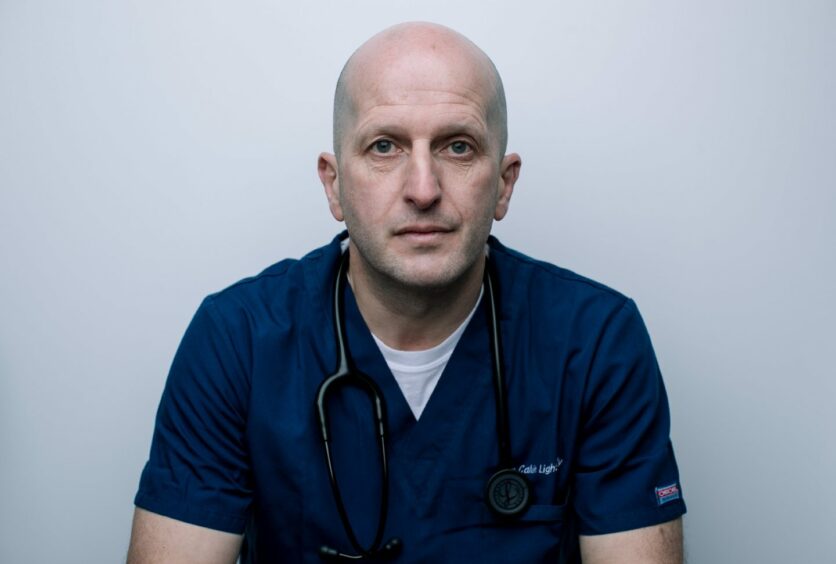
An A&E consultant has told how the mounting pressures of working in an emergency department forced him to go part-time to stop him burning out.
Dr Calvin Lightbody is now spending more time coaching other medical staff in how to manage the stress of their jobs to stop them being quitting the NHS.
On his decision to stop seeing patients full-time, he said: “It was a matter of burnout or get out.”
He added: “Working part-time is my way of continuing to work in emergency medicine, which I love, until I retire.
“I benefited from coaching in 2020 when I was having some stress related and wellbeing issues of my own and was able to experience the positive, lasting effects. If I can help others by coaching them, I am more than happy. A&E teaches you to relate to patients on their level and establish what’s really on their mind to make prompt diagnoses with empathy and understanding. However, it is the front door of hospital medicine and incredibly stressful.
“I found a route to continue by learning to coach colleagues and that allows me to put something else back into the NHS.
“In terms of stress, I and others are certainly exposed at the sharp end of the health service and we are trying to survive.
“Reducing the hours I work in A&E and coaching colleagues has significantly improved my work-life balance and ensures my chosen medical career does not break me. There were times though, when I found myself sitting in the car park before a shift psyching myself and dreading what was in front of me.
“Recovering from gruelling night shifts became more difficult and I was spending less time with my two children and wife.”
Lightbody is aware of the numbers of doctors leaving the NHS. The Nuffield Trust health think tank revealed that 7,470 nursing staff including midwives left the NHS in Scotland in the year to last March.
The General Medical Council reported that more than 6,000 references, required by doctors wanting to work abroad, had been issued last year. And the suicide rate of doctors is up to five times that of the general population, a trend acknowledged by the British Medical Association and other bodies but to a lesser extent by current governments.
Lightbody, who works in central Scotland, said: “I feel it is vital to do what’s necessary to retain NHS staff because without confident and dedicated people, it won’t work properly.”
Coaching works by helping people build resilience to the negative pressures and constant stress of work by getting them to examine the causes and then develop healthy coping strategies.
“We then work together to establish a vision for success in their career and move towards their real potential,” Lightbody added.
Stressed NHS workers include those who feel they can do little for patients. Lightbody coached a nurse who was ready to quit because stress from the pandemic was compounded by the number of patients who had deteriorated after cancelled appointments during lockdown.
“She felt she had failed because her patients had not improved and guilty about being torn between her work, children and elderly parents,” said Lightbody.
“Losing a valued and experienced staff member would have been a loss to our NHS so with coaching we identified her key priorities at work and better ways to tell senior managers she needed help. Essentially, if we don’t look after ourselves, we can’t care for others.”

Enjoy the convenience of having The Sunday Post delivered as a digital ePaper straight to your smartphone, tablet or computer.
Subscribe for only £5.49 a month and enjoy all the benefits of the printed paper as a digital replica.
Subscribe © Andrew Cawley
© Andrew Cawley